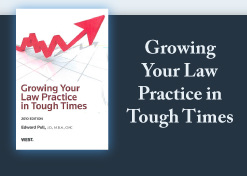|
Do You Know If You Own
What You Know?
The firm that is able to retrieve its pre-existing knowledge and use it again, a process known as knowledge management, will be more efficient, reduce its costs and provide excellent results for clients at a lower price. But this raises a question: Who owns the knowledge, who owns the forms, the precedent knowledge? Does the client who paid for it own it? Does the law firm own it? Or does the lawyer who created it own it? This becomes more important in an age of greater lateral movement.
The answers are mixed. In some instances, even if the work product was personally created by the lawyer, the copyright protection may attach to the documents and reside with the law firm, especially if the documents were created by employees (associates) as part of their jobs. This may not apply to partners, who as owners of the firm may have an asset interest in work product, depending on what the partnership agreement provides.
Another concept to review is whether the copyright belongs to the client. Here, one could use the "work for hire" concept in which the person for whom the work is created is the owner of the copyright. In this instance, files and their contents always belong to the client, not the firm or an individual lawyer.
Some clients stipulate as a condition of engagement that, because they own the intellectual property, the law firm must share it with other law firms who also handle the client's affairs, though usually in a different geographic area. Such clients do not want their lawyers to reinvent the wheel, and do not want to pay for others in the firm or another firm to re-create it. Two issues must be addressed for this to work. First, lawyers cannot create work product haphazardly,
wait until a matter is closed, then try to organize the information after the fact. Best practices require every firm, whether one lawyer or one thousand, to create a standard classification system for each lawyer's work. Second, lawyers cannot be holdouts. Some lawyers see work product classification as a threat that lets other firm members increase their compensation by using one's own hard work. Only a collective approach to compensation and client service can counteract this.
Especially thorny is when a lawyer leaves a firm and expects to continue client relationships. Although clients can request copies of their own files, the departing lawyer cannot do so when the explicit intent is to use them for taking clients from the firm. Does the lawyer intending to depart have the right to copy and take with him "precedent documents?" These are documents to be used when working on new matters of a similar nature. Who owns this work product? That is a question few lawyers consider.
|
|

Following the worst economic crisis since the Great
Depression, and facing a sea change in clients' demands
and expectations, law firms must respond and adapt
quickly and effectively. Law firms must choose the kind of
law practice they will be; the marketing and business
development tactics they will use; the overhead that is
critical to their functioning; how to price, bill and collect
for services; and how to manage the cash flow cycle.
Success lies in identifying and capturing the right kinds of
clients, providing the services those clients need in ways
that add value, and ensuring prompt payment and the
ability to grow profits. This book, based on the
experiences of Ed and his clients over 20 years of
coaching and consulting, provides the keys to
successfully thriving in the new era.
Now Available
Special New Release Price: $79
Regular Price: $120
Call or Order Online at:
1-800-837-5880
www.lawbiz.com





|

|
|
|

Personal Commentary
Our personal commentary this week is written from Winslow, AZ. We're on the road in our Airstream trailer. We spent the last few days in
Albuquerque, NM at the fabulous and huge Balloon Fiesta. Over 500 hot
air balloons were sent up. We watched them being assembled and then
fired up to fly the skies over Albuquerque. A magnificent site, indeed.
After that we proceeded to visit the Canyon De Chelley on the Navajo Nation in AZ. This visit satisfies a 35 year dream of my wife. We took a remarkable jeep ride into the depths of the canyon where Navajos still live and farm despite the rigors of the environment.
While this is a different experience, some believe this is as remarkable as its neighbor, the Grand Canyon.
Our sites on this trip, like the weather patterns we've experienced,
have been varied, from 100 degrees of heat a few days ago to cold, windy and rainy weather of today. This sounds like the varied nature of most law practices and the need to be flexible to meet the challenges of life while still enjoying it.
Best wishes,
Ed Poll
lawbiz.com
lawbizblog.com
www.LawBizForum.com
800-837-5880
Please use the URL below to link to this issue:
www.lawbiz.com/nlimages/tip-10-5-10.html
|

|

What Readers Are Saying...
"No matter how you slice it, there is
no substitute for wisdom and
experience. Ed Poll has
demonstrated both in this eyeopening
book about the essential
elements of running a profitable law
practice. He provides practical
wisdom along with simple ways to
adopt and incorporate best practices
for each. After explaining the pros
and cons of every decision, he makes
recommendations and provides
useful guides disguised as key
principles. Buy the book so you too
can access Ed's wisdom and
experience. It's worth much more
than the investment."
STEWART L. LEVINE. ESQ.,
FOUNDER, RESOLUTIONWORKS
AUTHOR, GETTING TO RESOLUTION;
THE BOOK OF AGREEMENT AND
COLLABORATION 2.0
|

|

|






